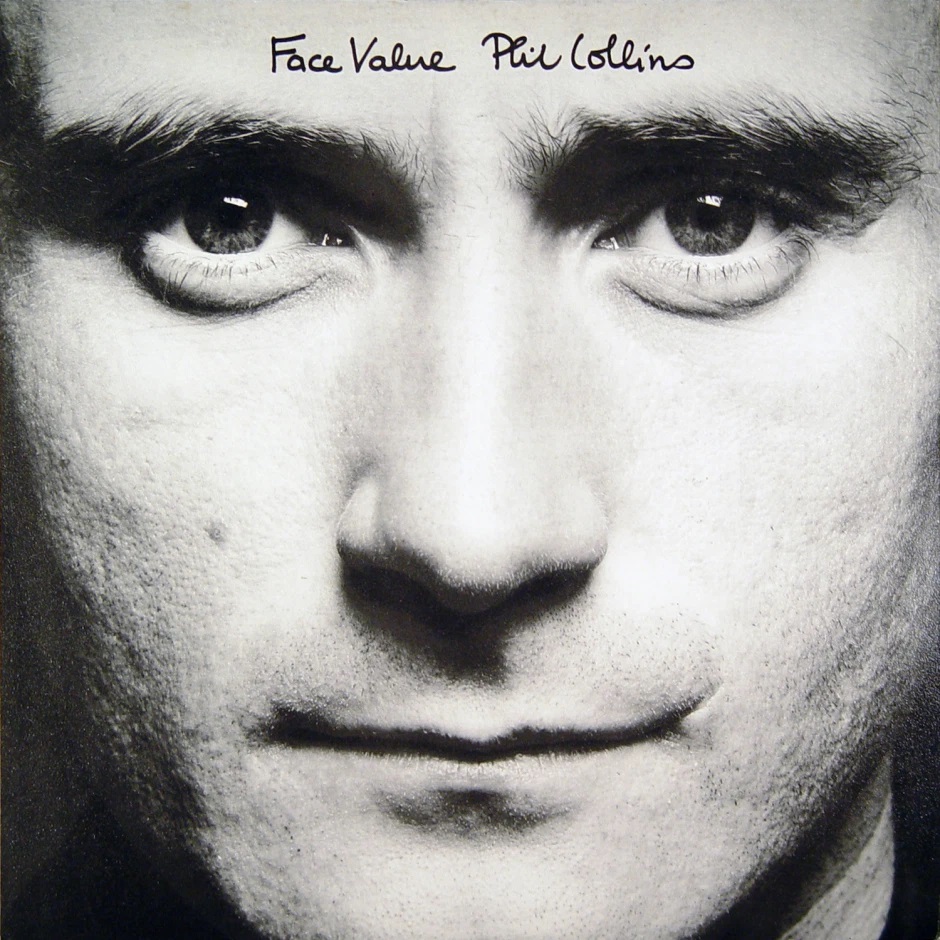1981 was one of those years that, once experienced, is best forgotten. The best way to summarise it would be to say that, if you were lucky-enough to be employed throughout and managed to survive economically (two aspects not necessarily mutually-linked), it was because you spent very little on non-essentials. Hence, when I looked at the list of what albums I actually bought, it is one of the shortest of all years. And from that very short list, one emerged as the best of the best – Phil Collins’ debut solo album Face Value.
The historians now officially call it a double-dip recession, but it was really the culmination of seven years of double-digit inflation that were effectively initiated by the three-day week of 1973/4. The second-highest of those was in the previous year, 1980, when inflation reached 18%. It is interesting to see some of the blogs and historical commentary online some forty years later, most of which is being written by people who, if they were alive at the time, were probably too young to fully-understand what was really happening.
I suppose the shortest way to illustrate the problem for many families at the time would be to ask the reader to imagine first that there is no such thing as fixed-rate mortgages or the ability to switch mortgage-provider at the drop of a hat. Then, taking that as a baseline, imagine base mortgage rates more than doubling in the space of a few months to a massive 16.5%. So, not a great time for a family with a single income to have recently moved to a new house by taking-out a much larger mortgage than, perhaps, they should have done!
But we survived, somehow. There were precious few visits to a record shop during that year, not simply because there was little spare cash to spend, but also because, to be honest, all I can remember was working as much overtime as I could find, including weekends. However, the first purchase of the year became a regular on all players, and remained so throughout the year, taking my personal accolade of Album of the Year. It shouldn’t be any surprise really, because it is a Classic despite the artist being the sport of many a social media troll these days – for reasons I have never quite fathomed.
Phil Collins had been the drummer in Genesis for ten years when he recorded this, his first, solo album. When he joined them in 1970 he was, in fact, the fourth drummer the group had in as many years, so it is quite pertinent that their fortunes changed with the first album they recorded with him in the rhythm section. Five years later, founder and lead singer Peter Gabriel left to forge his own solo career, and the band found it equally-difficult to find a suitable replacement. Eventually, it was decided that Collins would take the role for one album, Trick of the Tail, which was the band’s first album that I really hit it off with, also becoming my Album of the Year in 1976. It was the first of a run of highly-successful albums, all of which were fronted by Collins which, added to the previous observation, pretty-much speaks for itself.
Much has been written about the difficult marriage break-up that forged the music on this album, some commentators even suggesting that it was the raison d’etre for the album. However, hearing what Phil Collins himself has had to say on the matter over the years it is apparent that, although the emotional aspects were an obvious driver for the songwriting, the desire to do something of his own away from the band’s own style had been there for many years. So when both Mike Rutherford and Steve Hackett decided to use extended downtime after the 1978 Genesis world tour to pursue their own solo projects, this provided the opportunity he had been waiting for.
Most importantly, the album does not sound like a Genesis side-project. Yes, there is the occasional obvious side-reference, even a cover, but the whole feel of the album is more soulful. There are massive nods to R&B and southern blues throughout, not least through the inclusion of the Phenix Horns (Earth, Wind & Fire’s brass section) in the recording sessions from square one. Daryl Stuermer, the guitarist who became a fixture in the Genesis live band, also features heavily on this album. It was produced by Hugh Padgham who, through this collaboration, went on to produce not only subsequent Collins solo albums, including the Grammy-winning follow-up No Jacket Required, but also three of Genesis’ most successful albums of the 1980s. The overall result in this case is a very varied album style-wise, even including some instrumental tracks, making it very easy to listen to over and over again.
This is probably the best live performance of In the Air Tonight, from the First Farewell Tour in 2004, that features the epically-timed walk to the drumkit. Not a bad band either – Daryl Stuermer on lead, Leland Sklar on Bass and Chester Thompson on drums
Phil introduces himself to his listeners with the very first track, the absolute classic In the Air Tonight. There can be nobody out there who hasn’t air-drummed that break midway through at some time in their lives which, on first-hearing, comes as a big surprise after the atmospheric opening, but afterwards is awaited with immense anticipation – every time you hear the track. If it is not the only drum-hook in existence, then it was certainly the first. But instead of heralding another big-sound, the second track is the gentle This Must Be Love, accompanied by little more than a keyboard and bongos.
Track three is a funky cover of Behind the Lines, the opening track from the Genesis album Duke which, when stripped of its rock-intro status, works extremely well. Then another change of mood and style in the delta-bluesy The Roof is Leaking accompanied by little more than piano, banjo and steel guitar. The last two tracks on side one are instrumentals, both with some unmistakeable Genesis DNA in them. Track five, Droned, primarily features Collins playing piano over some bongos, whereas the final track on this side, Hand in Hand, starts very much like a long Genesis track with a youth choir replacing what might otherwise be Tony Banks’ keyboards, interspersed with very prominent brass segments.
Side two opens with the more poppy second single I Missed Again, with some funky horn backing, including a saxophone solo from none other than Ronnie Scott. Track eight goes all introspective again with You Know What I Mean, which links into the more funky Thunder and Lightning with some great guitar licks from Daryl Stuermer. The tempo stays up for another more pop-oriented track, I’m Not Moving, but settles back to the absolute heart-on-sleeve break-up song If leaving Me is Easy, which opens with a plaintive alto-sax solo, and also features a guest appearance by Eric Clapton.
The final track is a Beatles cover – Tomorrow Never Knows. Many critics have panned this version, whilst others have questioned its inclusion on an otherwise outstanding record. My feeling is it was a late-inclusion, personal tribute to John Lennon, who had been shot just weeks before the album was released. In fact, In the Air Tonight was only kept off the singles-chart top-slot by Woman, posthumously-released from Lennon’s final album, Double Fantasy. If so, what does it matter what the critics think, and if they are that concerned then just finish playing it after track eleven!
The other albums from which the final selection was made included debuts from Spandau Ballet, Journeys to Glory, and Soft Cell, Non-Stop Erotic Cabaret. The others were Dare! by Human League, Tin Drum by Japan, Present Arms from UB40 and Anthem from Toyah. Nevertheless, that’s a pretty-strong shortlist, and would probably not have been challenged from purchases in later years such as The J.Geils Band’s Freeze Frame, Landscape’s From the Tea-Rooms of Mars to the Hell Holes of Uranus, which has got to be one of the best album titles of all time, Third World’s Rock the World and Misty in Roots’ Wise & Foolish – although I have included tracks from those albums in the Top 50 tracklist, otherwise it would have been dominated by singles.
Both the Japan and Soft Cell albums have one or two outstanding individual tracks on them, but overall are a bit thin. Journeys to Glory was a very strong debut which, to my mind, the band never managed to recreate with their later albums, despite having some huge singles hits. The UB40 album is one of their best, and hit a particularly theme that was very pertinent of the times, particularly the stand-out track One in Ten, which is probably why it not only narrowly missed-out here, but also doesn’t get played as often nowadays as it should.
So the resultant top three were Face Value, Dare! and Anthem. In all honesty I wouldn’t change that, as the Phil Collins album is a tour de force and deserves a place in any Top 100 of all time, despite the aforementioned social media sport of knocking everything both he and Genesis have ever done. Probably the same people who glibly dismiss the politics of 1981 as ‘a necessary adjustment’ despite never having to make such a thing.
If you want to download or stream any of the top three albums, or some of the others, here are the links:
| Artist | Title | Download | Stream | |
| Phil Collins | Face Value | |||
| Human League | Dare! | |||
| Toyah | Anthem | |||
| UB40 | Present Arms | |||
| Soft Cell | Non-Stop Erotic Cabaret | |||
| Spandau Ballet | Journeys to Glory | |||
| Japan | Tin Drum |
I have also compiled a playlist containing fifty of the best tracks from 1981. To stream the playlist on Spotify, click the logo below:


